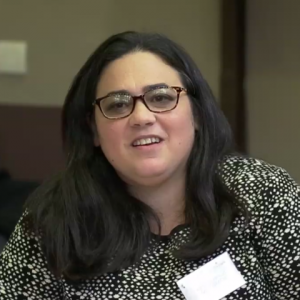Stories from the field
What makes mid-level theory-building sexy?
Here’s the deal: social accountability practitioners like information that tells their story, is useful to inform decisions, and helps them get better at what they do. Turns out, theory can help produce information with these characteristics if it anticipates the sorts of insights we generate and can act on. But not all theory is well suited to all actions. Although a conversation about mid-level theory-building for social accountability sounds boring, it still manages to get a few hundred people to sign up and engage with yet another Zoom call.
I  ️ theory
️ theory
About two years ago, I wrote a blog post about the frustrating state of the debate about evidence and learning in the transparency and accountability field. Then, along with some colleagues we convened a “safe space” to listen and reflect with practitioners about the work. They told us that social accountability for service delivery is interesting and important, yet it’s a curious blindspot in the debate.
If you read my previous posts, you already know that I think that a big part of our problem are the assumptions we make about what the work is, how it happens, and when, where and how we should expect particular types of results. I’m passionate about theory. Maybe that is because I refuse to think of theory and theories of change as a tick box exercise. Maybe that is because, unlike many evaluators, I regularly use theory to navigate and make sense of messy realities and results so I can act on those insights. Maybe that is because theory has helped me build narratives and make the case for valuable but not always valued work. Regardless, there is something oddly fascinating about theory for action.
Not all theories are alike
Can I let you in on a secret? It’s not any type of theory that gets my mind going. Personally, when it comes to social accountability and governance, I am not into theories of everything, i.e. theories that are so grand that they parsimoniously explain why all kinds of stuff happens everywhere. Yet I find micro-theories that are so detailed in a specific case potentially useful when I am knee-deep in a case or project.
Both extremes have their uses, but they leave me uneasy. These theories often obscure insights that can be useful for my work with partners. They rarely give me feasible rules of thumb to prioritize the use of scarce time and money. Conversely, I find mid-level theory (or mid-range theory) especially attractive. These are theories that are neither too abstract nor too concrete and theories that neither expect to explain a single case nor be universally applicable. That definition is too abstract in itself, right? I know.
So, think about patterns, types or groupings of social accountability practice:
- a group of social accountability practitioners working around the world to strengthen health systems,
- a group of social accountability practitioners figuring out how to contribute to learning when kids are in and out of school.
In my experience, when you bring them together you’ll find there are many differences across and within groups. However, ask them the right question and you’ll have them talking about issues of common interest, and identifying meaningful patterns (some captured here and here). It’s hard to figure out how to pre-identify the unifying threads and boundaries of productive conversations, as mid-level theory would, but when you do, let me tell you, what happens: magic. One can move beyond stating that “context matters,” to pinpointing what about context may matter when it comes to enabling more productive learning and work. One can move beyond using scarce attention and resources and collecting piles and piles of micro-data, to focusing instead on what seems to matter most.
Mid-level theory gets traction
A few weeks ago, I learned that mid-level theory for social accountability’s magic can be spread and shared. We organized a webinar. It had a long title and an abstract that was all but appealing. One would think that only real geeks and the usual suspects would be interested in the conversation. But surprise, surprise: a lot of people showed up and engaged extensively. And the conversation is still going.
A few top-line headlines about why I think mid-level theory might have got some traction:
- Build theory for users with real, if competing needs.
- Get (re)inspired together.
- Candor and practical tips to get better at our jobs.
Want to read beyond the headlines? Click here. Want to hear more? Watch or join our multi-lingual crowd next time around. We are keeping it going, because #daprafazer (i.e. #canbedone).
Authors

Florencia Guerzovich
Independent consultant, Senior Advisor Monitoring, Evaluation, Research and Learning at the Global Partnership for Social Accountability, the World Bank
Rowlands Kaotcha
Mr. Rowlands Kaotcha is a Global Vice President and Director for Africa and Mexico, after having served as the Southern Africa Regional Director for The Hunger Project, Country Director in Malawi since 2004, and as dual Country Director of Malawi and Mozambique since October 2017. Recently, Rowlands led The Hunger Project’s expansion into Zambia and also serves as the Southern Africa coordinator for the Movement for Community-led Development.
related content
Capitalizing on the ability of civil society organizations to collect information from users of public services about the state of public service delivery, and effectively channeling this information to decision-makers in government and parliament can contribute to evidence-based policymaking, and, ultimately, to improved public services.
